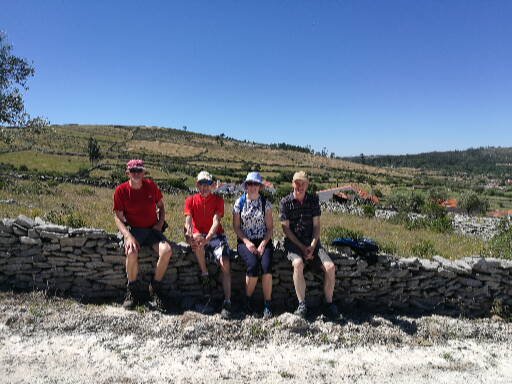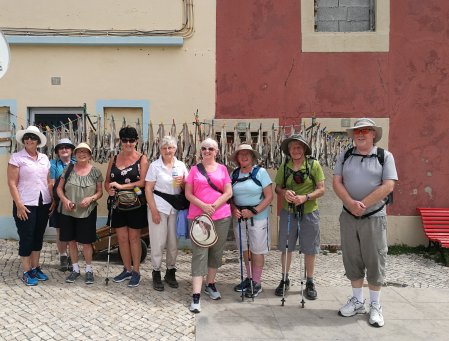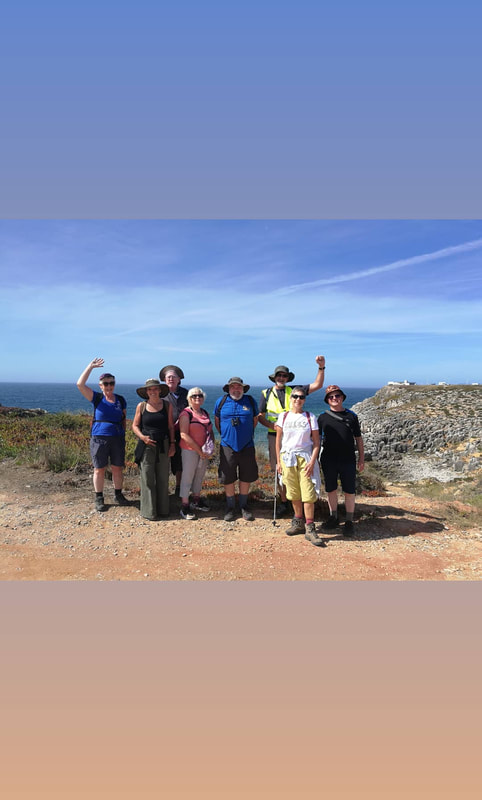Some helpful info for your trip
When travelling to Portugal you should bring sunglasses and sun cream at any time of year. You’ll need a hat in summer and insect repellent for mosquitoes and other biting insects. Clothes-wise, several thin layers are a good idea as they allow you to adapt to changeable temperatures. Loose, lightweight natural fibers will help you cope with the summer heat but you’ll need jeans and sweaters in winter.
Bring comfy shoes or sandals, depending on the season, preferably with non-slip soles. The cobbled streets can be pretty demanding on your feet. The Camino and Pilgrimage walks both involve time on tarmac roads and uneven granite cobblestones as well as rough dirt tracks. So you’ll need good cushioning and shock-absorbing footwear for these walks. Whether you choose hiking boots or shoes, make sure they’re waterproof and preferably lightweight, breathable and not too tight. If you’re walking in cooler weather, you may be wearing two pairs of socks. In hotter weather your feet are likely to swell so they will need space. Trail socks that have cushioning in places where blisters or hard skin form and mesh on the top are best. You will need a small rucksack or backpack for water, snacks, sun cream etc.
Weather-wise, May, June and September are usually hot but not unbearably so. The risk of rain increases from October to April, and it can get cool at night. But it’s possible to get lovely sunny days at any time of year. The hottest, busiest and most expensive months are July and August.
Double check that your passport is in date – you may need at least 6 months if coming from outside the EU. By law, you have to carry photo ID when in Portugal. Leave your passport in the safe at your accommodation and keep a photocopy with you. Or carry some alternative form of photographic ID like a driving licence.
If you live in the Europe, apply for and bring your European Health Insurance Card. It doesn’t substitute full travel insurance but will reduce the costs of emergency treatment. If you’re coming from elsewhere, you should make sure you have insurance to cover health emergencies. You don’t need any vaccinations for visiting Portugal unless you’re coming from a Yellow Fever zone. If you have an EU passport, you don’t need a visa to enter Portugal.
It's good to have some local currency on you when you arrive, preferably in small notes. Many smaller towns won't have change for larger notes. It helps to break it up. i.e. don't arrive with bundles of €50 notes. There are ATM's, look for Multibanco. You can withdraw euros directly from your bank account or top up your cash if you run out. Credit cards are accepted in many places but smaller outlets, including some restaurants, only take cash.
It’s not standard practice for Portuguese accommodations to have tea-making facilities in guest rooms even if they do have a fridge. Eating out it is standard practice for waiters to bring you little dishes of olives, bread, cheese and cold meats. But they are not freebies unless they are part of a set menu. If you don’t want them, just politely send them back untouched and you won’t be charged. Don’t be surprised if your main course seems lacking in vegetables. Many Portuguese get their greens and other vegetables by starting a meal with a soup. Ask what the main dish is served with and order a side salad or vegetables if you feel the need. Some restaurants close from 3pm to 6pm so check their opening times, usually available at the main door. Or book in advance. Most will have vegan, vegetarian and gluten free options.
If you have any other queries contact us at
[email protected] and we will be glad to help.
When travelling to Portugal you should bring sunglasses and sun cream at any time of year. You’ll need a hat in summer and insect repellent for mosquitoes and other biting insects. Clothes-wise, several thin layers are a good idea as they allow you to adapt to changeable temperatures. Loose, lightweight natural fibers will help you cope with the summer heat but you’ll need jeans and sweaters in winter.
Bring comfy shoes or sandals, depending on the season, preferably with non-slip soles. The cobbled streets can be pretty demanding on your feet. The Camino and Pilgrimage walks both involve time on tarmac roads and uneven granite cobblestones as well as rough dirt tracks. So you’ll need good cushioning and shock-absorbing footwear for these walks. Whether you choose hiking boots or shoes, make sure they’re waterproof and preferably lightweight, breathable and not too tight. If you’re walking in cooler weather, you may be wearing two pairs of socks. In hotter weather your feet are likely to swell so they will need space. Trail socks that have cushioning in places where blisters or hard skin form and mesh on the top are best. You will need a small rucksack or backpack for water, snacks, sun cream etc.
Weather-wise, May, June and September are usually hot but not unbearably so. The risk of rain increases from October to April, and it can get cool at night. But it’s possible to get lovely sunny days at any time of year. The hottest, busiest and most expensive months are July and August.
Double check that your passport is in date – you may need at least 6 months if coming from outside the EU. By law, you have to carry photo ID when in Portugal. Leave your passport in the safe at your accommodation and keep a photocopy with you. Or carry some alternative form of photographic ID like a driving licence.
If you live in the Europe, apply for and bring your European Health Insurance Card. It doesn’t substitute full travel insurance but will reduce the costs of emergency treatment. If you’re coming from elsewhere, you should make sure you have insurance to cover health emergencies. You don’t need any vaccinations for visiting Portugal unless you’re coming from a Yellow Fever zone. If you have an EU passport, you don’t need a visa to enter Portugal.
It's good to have some local currency on you when you arrive, preferably in small notes. Many smaller towns won't have change for larger notes. It helps to break it up. i.e. don't arrive with bundles of €50 notes. There are ATM's, look for Multibanco. You can withdraw euros directly from your bank account or top up your cash if you run out. Credit cards are accepted in many places but smaller outlets, including some restaurants, only take cash.
It’s not standard practice for Portuguese accommodations to have tea-making facilities in guest rooms even if they do have a fridge. Eating out it is standard practice for waiters to bring you little dishes of olives, bread, cheese and cold meats. But they are not freebies unless they are part of a set menu. If you don’t want them, just politely send them back untouched and you won’t be charged. Don’t be surprised if your main course seems lacking in vegetables. Many Portuguese get their greens and other vegetables by starting a meal with a soup. Ask what the main dish is served with and order a side salad or vegetables if you feel the need. Some restaurants close from 3pm to 6pm so check their opening times, usually available at the main door. Or book in advance. Most will have vegan, vegetarian and gluten free options.
If you have any other queries contact us at
[email protected] and we will be glad to help.




